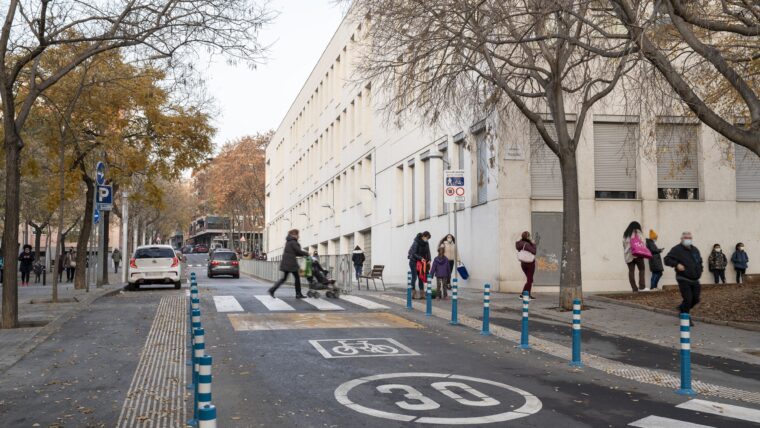
Statement denouncing the decision to eliminate the 30 km/h limit in school environments during nights, Sundays and holidays
We do not understand what the Barcelona City Council is trying to do by sending this message of understanding/complicity to those who want to run more.
speed kills Physics says it, the higher the speed, the greater the impact in the event of an accident and the injuries are more serious. Therefore, measures that help reduce speed save lives. Those people who obey the speed limits do not have to worry about speed controls. We would therefore have to ask those who bother speed controls.
It is not a local issue. In 2021, the UN Week for Road Safety promoted the speed limit of 30km/h in cities around the world and the World Health Organization encouraged all cities in the world, through the #Love30 campaign, to establish this limit in order to save lives. In fact, Barcelona was a pioneer in adopting 30km/h to a large part of its streets, since the pedestrian and vehicle circulation ordinance approved in 2007. A rule, but very unknown, and widely ignored and very little controlled. We all need to respect measures that prevent accidents and improve coexistence. 30 km/h should be the usual speed on our streets, one more step to continue working on the accident rate with Vision Zero (zero deaths and zero serious injuries).
Speed is one of the main context conditions that cause an accident to occur or not (it affects reaction time and braking distance) and also affects its severity if it does occur. According to data from the DGT, only 5% of hit-and-runs at 30 km/h end up having fatal consequences, compared to 50% at 50 km/h. Therefore, the policy of gradually reducing the speed of circulation in the urban area to 30 km/h and above all the effective compliance with this limit with all possible means, including sanctions, is a policy that saves lives without arguments in against or possible extenuating factors.
We put figures in the case of Barcelona. In the last balance of accidents for 2022, 23 people have died and 172 have been seriously injured, of which 111 were on a motorcycle or moped and 50 have been pedestrians hit by motorcycles, cars and vans. If we add the 9 seriously injured who were in a car or van, we have that 87% of the seriously injured or dead have been in accidents involving cars or motorcycles. These figures are intolerable, and do not allow the use of these vehicles in cities to be taken out of the spotlight.
Evolution of the number of people injured and killed in traffic accidents in the city of Barcelona 1987-2021

Source: Urban Guard
In this context, this morning the Barcelona City Council announced its intention to eliminate the 30 km/h limitation for schools —whether or not they have radars— when schools are closed, also saying that the decision “responds to the sense common”. The City Council itself announced in 2021 that it would install 49 new radars, and when the time came to do it, they did not reach half, 21: 12 were installed in school environments, due to the pressure of mobilized families, 4 section radars and 5 radars in specific points where there is too much running. The cut with respect to the plan that had already been announced was in these last points where there is too much running. Then it was said that it would start with a few and then expand if it was considered necessary. Now the City Council proposes to install the rest of the radars, but in an educational format, without there being a penalty. It was never done. We highlight that these sanctioning radars are part of the European Next Generation funds awarded, and therefore it will be necessary to justify before the Ministry of Transport, Mobility and Urban Agenda (MITMA), and also before the European Commission, for what objective reason they were not They have installed the rest of the control elements for which Barcelona City Council has received funding. In short, it is not acceptable that the tools to improve road safety, that is to say to save lives, are available and not used.
The entities that defend sustainable mobility in Barcelona do not share this lack of ambition in measures that are not only beneficial for schools, but also seek to improve road safety for everyone who moves around the city.
We do not understand what the Barcelona City Council is trying to do by sending this message of understanding/complicity to those who want to run more. Their reluctance to expand the sanctioning radars as an effective tool to reduce the accident rate will cost lives and tragedies to many families, who will have to suffer serious losses and injuries, with limiting consequences for their future, due to avoidable events such as traffic accidents.
With the support of: BACC, Cataluña Anda, PTP, Revuelta Escolar, FAVB and Eixample Respira.
You can see the reaction to the statement on BTV.











